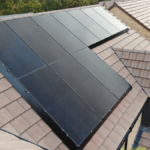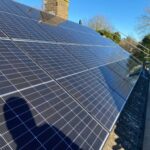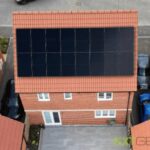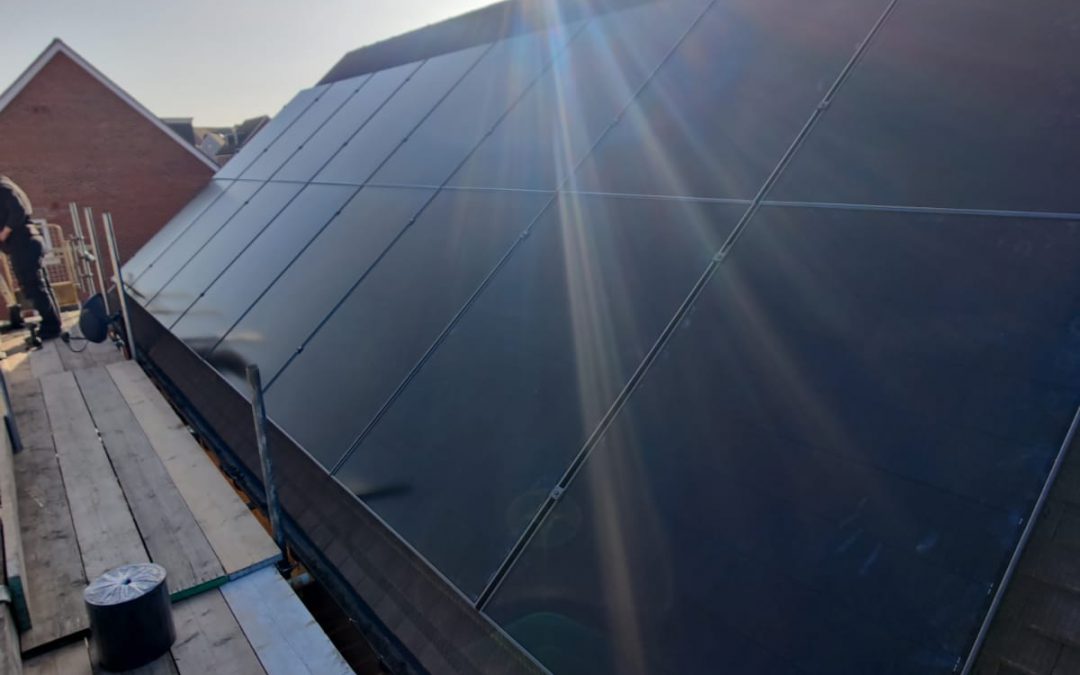


There short answer is no. Some have blamed renewable energy for the UK’s decision to use coal power for the first time in over a month – but that’s not the case, say green activists, as the mercury rose above 30C.
The National Grid activated Ratcliffe-on-Soar power station in Nottinghamshire yesterday, as more people turned on their air conditioners to cope with the heatwave.
This ended a 46-day streak without coal-generated electricity, the longest since last summer, and drew criticism from environmentalists.
“This is a sign of failure that the National Grid is resorting to one of the most polluting forms of power generation to deal with a summer heatwave that we know has been worsened by climate change”
Ami McCarthy, Greenpeace UK’s political campaigner
However, some commentators also blamed renewable technology. “The heatwave made Solar Panels too hot to work efficiently,” claimed right-wing UK newspaper the Telegraph.
Industry groups stated that’s not the full story, however. More solar power is produced in the summer than any other time – regardless of how hot it gets, as solar energy is produced from sunlight and not heat.
“The idea that solar panels wilt in the heat is a gross and fundamental misapprehension”
Solar Energy UK
Can solar panels cope in the hot weather?
Solar panels are slightly less efficient at higher temperatures. Solar Photovoltaic (PV) cells convert a slightly lower proportion of sunlight into electricity in hotter conditions, solar groups explain.
However, they are built to normally function from about -40C to +85C. Performance does fall when temperatures go above 25C, but only by 0.34 per cent for every additional degree.
According to NXTGEN Energy Ltd, even at close to boiling point, power output would only be around 20 per cent lower.
The UK’s leading technical expert on the technology, Alastair Buckley, Professor of Organic Electronics at the University of Sheffield says that high temperatures only marginally affect the overall output of solar power – it’s a secondary effect. The university provides live Solar PV generation data which backs this up; solar power has been serving around 27 per cent of the UK’s power needs each lunchtime for this past week. Solar panels work perfectly well in the Saudi Arabian desert – and the same panels are being installed there as on rooftops in Birmingham or a field in Oxfordshire.
Coal and gas stations are less efficient in heatwaves too
Solar Energy UK says that heat affects not only solar panels, but also thermal power plants – such as coal, gas and nuclear – that need cool water to operate. As the climate gets warmer, this problem will get worse.
“Solar panels may lose some efficiency in high temperatures, but they are still cheaper and greener than fossil fuels. We need more solar power to fight climate change,” states SolarPower Europe.
“We need to make the most of every ray of sunshine, and we need to prepare the system for the electrified economy. That means investing in the grid and storage, so we can use and distribute renewable energy efficiently”
A new report from the European industry group says that the UK’s solar potential is limited not by the sun, but by the lack of investment in the power network.
“In summer, solar power should be our main source of energy, but we are wasting renewable energy because our grid can’t handle it, and we have hundreds of renewable projects that are stuck because they can’t connect,” said McCarthy.
Coal is already on its way out in the UK. It only produces 2 per cent of the electricity, and it will be phased out by October 2024.
Frequently Asked Questions about Solar Panels
Latest Solar Panel Posts
- Solar Panels: Pros, Cons, and Whether They’re Worth It
 Solar panels can cut your energy bills by up to 70%, and surplus electricity can be sold back to the National Grid through the Smart Export Guarantee (SEG) Scheme. They reduce your carbon footprint, require minimal maintenance, and can last over 30 years, making them a long-term eco-friendly investment. Upfront costs are… Read more: Solar Panels: Pros, Cons, and Whether They’re Worth It
Solar panels can cut your energy bills by up to 70%, and surplus electricity can be sold back to the National Grid through the Smart Export Guarantee (SEG) Scheme. They reduce your carbon footprint, require minimal maintenance, and can last over 30 years, making them a long-term eco-friendly investment. Upfront costs are… Read more: Solar Panels: Pros, Cons, and Whether They’re Worth It - Understanding Solar Panel Efficiency
 Solar panels convert sunlight to electricity through photovoltaic cells, storing extra energy for later use. There are three main types of solar panels: monocrystalline, polycrystalline, and thin-film. Monocrystalline panels lead in efficiency (20%+), but new technologies are improving performance continuously. Solar panels save money, boost property value & reduce environmental impact,… Read more: Understanding Solar Panel Efficiency
Solar panels convert sunlight to electricity through photovoltaic cells, storing extra energy for later use. There are three main types of solar panels: monocrystalline, polycrystalline, and thin-film. Monocrystalline panels lead in efficiency (20%+), but new technologies are improving performance continuously. Solar panels save money, boost property value & reduce environmental impact,… Read more: Understanding Solar Panel Efficiency - How SolaSkirt Can Protect Your Solar Panels
 Pigeon Issues: Pigeons under solar panels damage cables, leave guano, spread disease & create noise. SolaSkirt Fix: Aluminium barrier that blocks pigeons, enhances panel look, and installs without damage. Top Benefits: Durable, weatherproof, maintenance-free, and improves aesthetics & efficiency of panels. Cost-Saving: An affordable pigeon proofing solution that prevents expensive future… Read more: How SolaSkirt Can Protect Your Solar Panels
Pigeon Issues: Pigeons under solar panels damage cables, leave guano, spread disease & create noise. SolaSkirt Fix: Aluminium barrier that blocks pigeons, enhances panel look, and installs without damage. Top Benefits: Durable, weatherproof, maintenance-free, and improves aesthetics & efficiency of panels. Cost-Saving: An affordable pigeon proofing solution that prevents expensive future… Read more: How SolaSkirt Can Protect Your Solar Panels - Are Brits Turning Their Backs on Solar Panels?
 High upfront costs: Deter many Brits from installing solar panels despite falling prices & financing options. Myths debunked: Solar panels work in cloudy weather, need minimal maintenance & can last 25–30 years. Financial & Environmental benefits: Solar panels cut electricity bills by up to 70% & lower carbon footprints. Government support… Read more: Are Brits Turning Their Backs on Solar Panels?
High upfront costs: Deter many Brits from installing solar panels despite falling prices & financing options. Myths debunked: Solar panels work in cloudy weather, need minimal maintenance & can last 25–30 years. Financial & Environmental benefits: Solar panels cut electricity bills by up to 70% & lower carbon footprints. Government support… Read more: Are Brits Turning Their Backs on Solar Panels? - Solar Panel System Maintenance in the UK
 Regular Maintenance: Ensures optimal performance, maximizes energy efficiency & prevents costly repairs. Common Issues in the UK: Dirt, debris, bird droppings & ice build-up require regular cleaning & inspections. Best Practices: Clean panels with soft cloth & water, monitor performance & schedule maintenance visits. Seasonal Tips: Spring cleaning, summer heat protection,… Read more: Solar Panel System Maintenance in the UK
Regular Maintenance: Ensures optimal performance, maximizes energy efficiency & prevents costly repairs. Common Issues in the UK: Dirt, debris, bird droppings & ice build-up require regular cleaning & inspections. Best Practices: Clean panels with soft cloth & water, monitor performance & schedule maintenance visits. Seasonal Tips: Spring cleaning, summer heat protection,… Read more: Solar Panel System Maintenance in the UK - Are solar panels worth it? NXTGEN Energy’s guide to getting started
 Installing solar panels can significantly reduce electricity bills, with prices dropping in recent years. Solar panels are a good investment for those with the space, daytime electricity usage & a south-facing roof. Consider financing options carefully, as borrowing can be expensive; paying outright provides better returns. Solar batteries store energy for… Read more: Are solar panels worth it? NXTGEN Energy’s guide to getting started
Installing solar panels can significantly reduce electricity bills, with prices dropping in recent years. Solar panels are a good investment for those with the space, daytime electricity usage & a south-facing roof. Consider financing options carefully, as borrowing can be expensive; paying outright provides better returns. Solar batteries store energy for… Read more: Are solar panels worth it? NXTGEN Energy’s guide to getting started - How Amazon is Preparing for the Energy Needs of the Future
 Amazon has over 600 renewable energy projects globally, with 230+ in Europe. These efforts support Amazon’s goal of net-zero carbon emissions by 2040. Amazon remains the top global and European corporate renewable energy buyer for the fifth year. Key achievements include 46 new projects in Europe, doubling Japan’s capacity & 53 projects in India. Discover… Read more: How Amazon is Preparing for the Energy Needs of the Future
Amazon has over 600 renewable energy projects globally, with 230+ in Europe. These efforts support Amazon’s goal of net-zero carbon emissions by 2040. Amazon remains the top global and European corporate renewable energy buyer for the fifth year. Key achievements include 46 new projects in Europe, doubling Japan’s capacity & 53 projects in India. Discover… Read more: How Amazon is Preparing for the Energy Needs of the Future - How Solar Panels Increase Property Value
 Solar panels can boost your home’s value by an average of £2,000 & command a price premium of 0.9% to 2%. Homes with solar panels have better EPC ratings, which can increase property value by up to 14%. Eco-friendly homes are in high demand, making solar-powered homes more attractive to buyers. … Read more: How Solar Panels Increase Property Value
Solar panels can boost your home’s value by an average of £2,000 & command a price premium of 0.9% to 2%. Homes with solar panels have better EPC ratings, which can increase property value by up to 14%. Eco-friendly homes are in high demand, making solar-powered homes more attractive to buyers. … Read more: How Solar Panels Increase Property Value - Did You Know That Solar Costs Have Fallen by 82%?
 Solar panel costs have dropped by 82% since 2010, making solar energy more accessible for UK homeowners. Factors to consider before switching to solar include initial investment, energy savings, and roof suitability. Government incentives, such as the Smart Export Guarantee (SEG) scheme, can help offset the initial costs. NxtGen Energy offers… Read more: Did You Know That Solar Costs Have Fallen by 82%?
Solar panel costs have dropped by 82% since 2010, making solar energy more accessible for UK homeowners. Factors to consider before switching to solar include initial investment, energy savings, and roof suitability. Government incentives, such as the Smart Export Guarantee (SEG) scheme, can help offset the initial costs. NxtGen Energy offers… Read more: Did You Know That Solar Costs Have Fallen by 82%? - Advantages of Solar Energy in 2025
 Reduces carbon emissions & improves air quality by producing clean, renewable energy. Lowers electricity bills and provides long-term financial benefits for homeowners & businesses. UK government incentives, like the Smart Export Guarantee, make solar adoption more attractive. Expands workforce opportunities & boosts local economies through investments in the solar energy sector.… Read more: Advantages of Solar Energy in 2025
Reduces carbon emissions & improves air quality by producing clean, renewable energy. Lowers electricity bills and provides long-term financial benefits for homeowners & businesses. UK government incentives, like the Smart Export Guarantee, make solar adoption more attractive. Expands workforce opportunities & boosts local economies through investments in the solar energy sector.… Read more: Advantages of Solar Energy in 2025 - Solar Panel Bird Proofing [2025]
 Bird proofing solar panels in the UK is essential for preventing damage and maintaining efficiency. Birds nesting under panels and their droppings can significantly reduce solar panel efficiency. Effective methods include physical barriers, auditory deterrents, and humane control measures. Bird proofing increases energy efficiency, extends panel lifespan, and complies with UK… Read more: Solar Panel Bird Proofing [2025]
Bird proofing solar panels in the UK is essential for preventing damage and maintaining efficiency. Birds nesting under panels and their droppings can significantly reduce solar panel efficiency. Effective methods include physical barriers, auditory deterrents, and humane control measures. Bird proofing increases energy efficiency, extends panel lifespan, and complies with UK… Read more: Solar Panel Bird Proofing [2025] - Solar Panels in Essex. Are they worth it? [2025]
 Solar panels can save Essex homeowners £300-£500 annually on electricity bills due to decent sunshine hours. The Smart Export Guarantee (SEG) tariff offers additional income for excess electricity exported to the Grid. Initial installation costs range from £4,500 to £8,500, but government grants can help reduce this expense. . Free no-obligation… Read more: Solar Panels in Essex. Are they worth it? [2025]
Solar panels can save Essex homeowners £300-£500 annually on electricity bills due to decent sunshine hours. The Smart Export Guarantee (SEG) tariff offers additional income for excess electricity exported to the Grid. Initial installation costs range from £4,500 to £8,500, but government grants can help reduce this expense. . Free no-obligation… Read more: Solar Panels in Essex. Are they worth it? [2025]


 Do solar panels break in heatwaves?
Do solar panels break in heatwaves?



